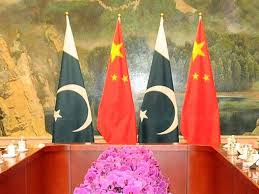
China-Pakistan cooperation to help in agricultural up-gradation, technological transfer to Pakistan: say experts
Islamabad: The experts and academics Friday said China-Pakistan agriculture cooperation would have huge potential and it would help in agricultural up-gradation and technological transfer to Pakistan.
The memorandum of understanding (MoU) between the two countries had provided the right kind of framework that needed to be vigorously pursued the goals of collaboration and cooperation in agriculture sector, Director General China at the Pakistan’s Ministry of Foreign Affairs Muhammad Mudassir Tipu said while sharing his views during an online dialogue on ‘China-Pakistan Agriculture Cooperation’ organized by the Sustainable Development Policy Institute (SDPI).
Tipu, while highlighting various aspects of the cooperation in the agriculture sector and MoU, said the decision-making on implementing this vision had been institutionalized through a consultative process covering various dimensions of the cooperation.
With the help of technology, hybrid seeds and training to farmers, he said, the productivity of wheat and other crops in Pakistan could be enhanced tremendously.
He added further that China had lent valuable support to Pakistan in locusts control efforts including the provision of pesticides, drones and other technological support.
Agricultural Commissioner at the Embassy of China in Pakistan, Dr Gu Wenliang said there was a lot of potential in Pakistan to enhance agricultural productivity through the use of better technology.
The Prime Minister Imran Khan had shown keen interest in enhancing cooperation and collaboration between the two countries in the agriculture sector during his visit to China and MoU signed between the two countries reflect the same approach on both sides.
He said agricultural technology exchange and cooperation in capacity building were some of the key elements of this cooperation and the China Pakistan Economic Corridor (CPEC) would be turned into a corridor of agriculture development, joint research laboratories and research centers.
He said Pakistani agricultural products may find huge market space in China and thus, Chinese experts were helping Pakistan to increase the productivity of various fruits, vegetables and crops.
SDPI Executive Director Dr Abid Suleri, earlier highlighted the vision behind CPEC and said the next phase of this landmark project had collaboration and cooperation in agriculture as its key component.
He said Pakistan needed to learn from China on drought-resistant wheat crops and it was an encouraging development that the hybrid seeds that were provided by China were already being tested in Pakistan.
“The special economic zones under CPEC should also include a ‘Food Security Zone,” Dr Suleri Said.
The transfer of technology and investing in the food value chain would help Pakistan to curtail imports and to start exporting various food items including the Hilal meat to different parts of the world, he said.
University of Agriculture, Faisalabad Former Vice Chancellor Dr Iqrar Ahmad Khan underpinned the importance of technological transfer from China to Pakistan and said Chinese support could play a crucial role in making Pakistan an agricultural efficient country.
SDPI Director Asia Study Center Shakeel Ahmed Ramay presented an overview of the role of agriculture in Pakistan’s economy and said this sector was an important not only for its contribution in gross domestic product but also to ensure food security and employment opportunities in the country.
